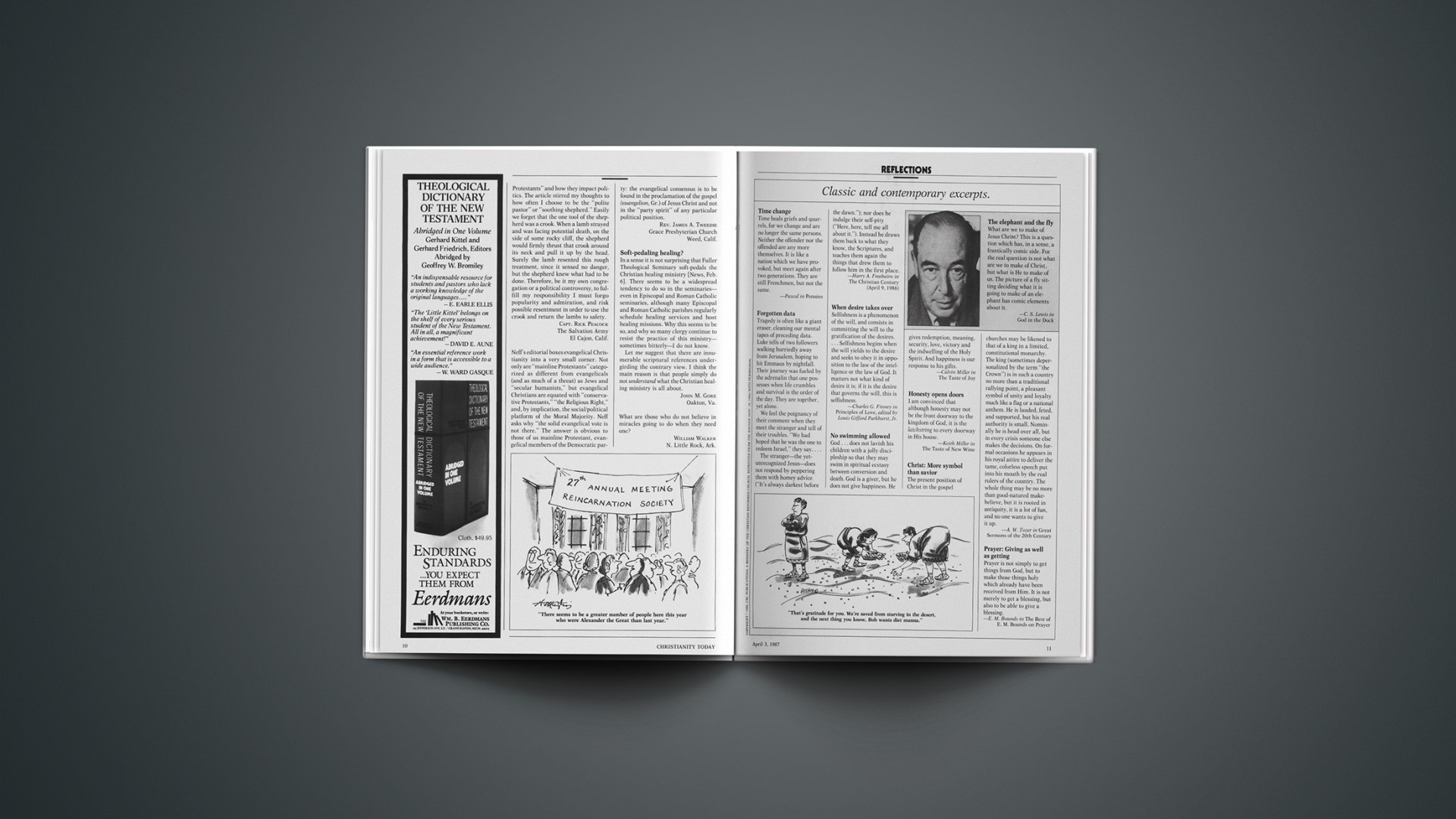Time change
Time heals griefs and quarrels, for we change and are no longer the same persons. Neither the offender nor the offended are any more themselves. It is like a nation which we have provoked, but meet again after two generations. They are still Frenchmen, but not the same.
—Pascal in Pensées
Forgotten data
Tragedy is often like a giant eraser, cleaning our mental tapes of preceding data. Luke tells of two followers walking hurriedly away from Jerusalem, hoping to hit Emmaus by nightfall. Their journey was fueled by the adrenalin that one possesses when life crumbles and survival is the order of the day. They are together, yet alone.
We feel the poignancy of their comment when they meet the stranger and tell of their troubles. “We had hoped that he was the one to redeem Israel,” they say.…
The stranger—the yet-unrecognized Jesus—does not respond by peppering them with homey advice (“It’s always darkest before the dawn.”); nor does he indulge their self-pity (“Here, here, tell me all about it.”). Instead he draws them back to what they know, the Scriptures, and teaches them again the things that drew them to follow him in the first place.
—Harry A. Freebairn in The Christian Century
(April 9, 1986)
When desire takes over
Selfishness is a phenomenon of the will, and consists in committing the will to the gratification of the desires.… Selfishness begins when the will yields to the desire and seeks to obey it in opposition to the law of the intelligence or the law of God. It matters not what kind of desire it is; if it is the desire that governs the will, this is selfishness.
—Charles G. Finney in Principles of Love, edited by Louis Gifford Parkhurst, Jr.
No swimming allowed
God … does not lavish his children with a jolly discipleship so that they may swim in spiritual ecstasy between conversion and death. God is a giver, but he does not give happiness. He gives redemption, meaning, security, love, victory and the indwelling of the Holy Spirit. And happiness is our response to his gifts.
—Calvin Miller in The Taste of Joy
Honesty opens doors
I am convinced that although honesty may not be the front doorway to the kingdom of God, it is the latchstring to every doorway in His house.
—Keith Miller in The Taste of New Wine
Christ: More symbol than savior
The present position of Christ in the gospel churches may be likened to that of a king in a limited, constitutional monarchy. The king (sometimes depersonalized by the term “the Crown”) is in such a country no more than a traditional rallying point, a pleasant symbol of unity and loyalty much like a flag or a national anthem. He is lauded, feted, and supported, but his real authority is small. Nominally he is head over all, but in every crisis someone else makes the decisions. On formal occasions he appears in his royal attire to deliver the tame, colorless speech put into his mouth by the real rulers of the country. The whole thing may be no more than good-natured make-believe, but it is rooted in antiquity, it is a lot of fun, and no one wants to give it up.
—A. W. Tozer in Great Sermons of the 20th Century
Prayer: Giving as well as getting
Prayer is not simply to get things from God, but to make those things holy which already have been received from Him. It is not merely to get a blessing, but also to be able to give a blessing.
—E. M. Bounds in The Best of E. M. Bounds on Prayer
The Elephant And The Fly
What are we to make of Jesus Christ? This is a question which has, in a sense, a frantically comic side. For the real question is not what are we to make of Christ, but what is He to make of us. The picture of a fly sitting deciding what it is going to make of an elephant has comic elements about it.
—C. S. Lewis in God in the Dock










